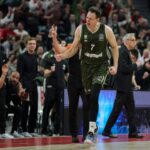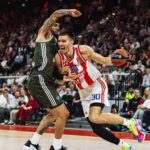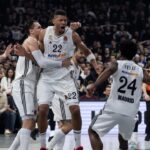
Besiktas introduces Deron Williams: It seems like so long ago...
Beşiktaş’ season, like any power in club hoops, began in the summer. All they did to top last year’s high-profile signing of the ultimately marginal Allen Iverson was ink Deron Williams, a franchise guard at his peak, to the biggest contract in European basketball with an NBA out-clause when the player lockout was to be settled.
From across the ocean, D-Will took a beating early in the mainstream media and blogosphere. The proclamations of ineptitude were fast and heavy: “He can’t hit shots.” “The man who should dominate at this level watched his team get eliminated fast.” “The biggest name in the NBA to sign overseas has not impressed anyone.” “Williams also looks out of shape.” “This is embarrassing.”
Said assessments were mostly made based on Williams’ first couple of games for Beşiktaş in October in which the money man went for a dismal 6-of-28 overall shooting to go with nine turnovers. Worse yet for his Black Eagles, the 74-63 loss to Dexia Mons-Hainaut early that month eliminated Beşiktaş from the 2011-12 Eurocup qualifiers two weeks before the TBL season started.
In that second match against Mons-Hainaut, the five starters – Marcelus Kemp, David Hawkins, Erwin Dudley and Zoran Erceg alongside the NBA refugee – all played for at least 32 minutes apiece, while no other Eagle managed more than 12. The thinness of depth was clearly a matter to be addressed, and management had the financial resources and willingness to do so.
What few abroad noticed was that the following week, D-Will and Beşiktaş was awakening enough to go 3-0 in three days’ worth of Spor Toto Turkish Cup basketball. In the key match against Banvit, a 75-73 victory for the Eagles, D-Will posted a none too shabby line of 17 points, seven assists and four steals – perhaps still not the heights of a “man who should be dominating at this level,” but certainly a viable team leader.
O, at this point, Semih Erden was suiting up for Beşiktaş and posted back-to-back double-doubles in games one and two in ‘Cup play.
The Eagles then continued roughing up TBL teams – including the Euroleague’s Fenerbahce Ulker – to jump out to a 5-0 start in the national league by mid-November. Williams put in a 24-point, 10-assist game against Pinar Karşiyaka and netted 20 against Fenerbahce; Erden was averaging a double-double; Kemp was active, integrated into the offense and always a 15-point threat; but the best in the short-term would come in EuroChallenge play.
Impressive was Beşiktaş’ 103-82 win over Armia. Williams was “en mode All Star” for 31 points, including 5-of-9 three-point shooting; Erden put in 20 points, grabbed three rebounds and snatched three steals; Hawkins was good for 17 points and three steals; and Kemp contributed 19 points and five rebounds.
Truly mind-blowing and record-shattering, however, was D-Will’s 50-point explosion against BC Göttingen in EuroChallenge week 3. Leading the team to a 105-94 win (yes, Beşiktaş’ point totals are quite high for a European club), Williams set personal and Eurochallenge marks with the five-oh.
On November 23 after the Göttingen win, the Eagles were 11-1 overall and the sky seemed the limit. The starting lineup had essentially remained the same since Eurocup qualifiers, though Serhat Cetin had been getting increased minutes.
Nevertheless and despite the success early, the Beşiktaş front office continued to hunt for big-name talent as the NBA lockout continued. Besides maybe the Virtus Bologna flirtation with Kobe Bryant, no team garnered so much attention from media as Beşiktaş. The team was linked by ESPN with the Minnesota Timberwolves’ Kevin Love and the Chicago Bulls’ Luol Deng. Love formally declined the offer to the sports giant, saying that “I didn’t feel it was the right decision for me at this time.”
While Odom seemed to be the highest-flight NBAer Beşiktaş could tempt in November, ESPN also reported that Beşiktaş officials had been informally wooing free agent Nene and Team Poland/Phoenix Suns big man Marcin Gortat, who was said to be “highly interested” in getting with the Turkish team. To make things even crazier, Turkish news outlets reported that Williams’ Nets teammate Brook Lopez had signed with the Black Eagles.
This later turned out not to be so, though, and Erden wouldn’t play again for Beşiktaş, suffering a broken finger in the Göttingen game. Williams was also out the door when the NBA’s opened again and Odom never did make the flight overseas. Yet after Williams’ number was retired – BiE still finds that one a bit hard to believe – Beşiktaş continued its nice run in the post-Williams era (We should call it that, with the jersey retired and all, right?) with a couple of EuroChallenge wins and a first-place finish in the group.
So going into 2012 – and another signing period – Beşiktaş had managed a 6-0 mark in the ‘Challenge and a 9-3 record in the TBL. What would happen next? How about the additions of Carlos Arroyo, Pops Mensah-Bonsu and Adam Morrison?
While Morrison would ultimately get the most American-centered hype in what appeared to be something of a comeback year firstly with Crvena Zvezda/Red Star Belgrade, it would be Pops and Carlos who led the Eagles the rest of the way; though good for double-digit scoring over the next 14 games with Beşiktaş at 11.9 points per game, the Eagles would not renew the former Zag’s contract in mid-March.
Mensah-Bonsu would ultimately run up lines of 18.5 ppg, 11.8 rpg and 1.0 bpg for Beşiktaş in the Eurochallenge; the numbers were 12.8 ppg, 7.8 rbg, and 0.8 bpg in TBL play while getting about 25% less playing time. Arroyo had lines of 10.7 ppg and 3.6 apg in the European league against 14.7 and 4.4 in the TBL.
For January 16 against Novgorod, the starting lineup for Beşiktaş was Erceg, Mensah-Bonsu, Hawkins, Morrison and Arroyo. Kemp spent some time out due to injury, but with this quintet starting most games, the Eagles were a combined 13-3 and advanced another step in the FIBA EuroChallenge. This version of the team represented the Black-and-Whites in the tournament round of the Turkish Cup in February, besting Aliaga Petkim, Galatasaray and Banvit in four days for its first-ever Cup win.
On March 13 and 15, the Eagles took both ends of a one-and-one with Artland Dragons to get themselves into the Eurochallenge Final Four; the lineup had evolved throughout the season but maintained the high-octane quality throughout its incarnations: Indeed, Beşiktaş scored fewer than 70 points just once in 16 Eurochallenge games. The Artland doubleheader was typical of the trend, with the Eagles fighting to a 77-74 victory in game one and cruising, 77-63, in two.
By late April, Beşiktaş bagged its second title of 2011-12, earning Eurocup entry by topping Elan Chalon in – you guessed it – a shootout, 91-86, in the Eurochallenge championship. At that time, Uygar Karaca of Eurosport speculated on BallinEurope about the possibility of Beşiktaş falling prey to the Eurochallenge Championship Curse; it’s a compelling argument, but one important key to remember is that, of the Eurochallenge champions, only LMT/Barons of Latvia took a national title in the same season.
Things at home sure didn’t make it look like Beşiktaş would join that group of one, though. The Black Eagles’ season finish got a little rocky, with Beşiktaş stumbling to a 5-3 finish with losses to Galatasaray, Banvit and Anadolu Efes; these would be the no. 1 through 3 seeds going into the TBL tournament and certainly did not bode well for fourth-place – and unheralded, despite EuroChallenge success – especially with traditional powerhouse Fenerbahce ranked fifth.
Wait, did BiE say “powerhouse”? “Ha!” responded Beşiktaş, who did just enough to take out Fenerbahce, two games to zero in the quarterfinals. Did BiE say “just enough”? You bet: how about margins of victory of two (in OT) and three points?
Though Beşiktaş never truly caught fire like Olympiacos on its continual come-from-behind run through two championships in 2011-12, the Black-and-Whites played doggedly throughout the playoffs to go 5-3 against Galatasaray and Anadolu Efes. In fact, two Beşiktaş losses – semifinal game one at Galatasaray and championship game three – came down to the final shot. And all the while, Mensah-Bonsu turned in more and more highlight clips to add to his personal collection.
Game six would be another cliffhanger for fans awaiting their first national title since 1975, but in the fourth quarter it was Beşiktaş that showed composure against the more seasoned Efes side to win the final ten minutes and the game, 79-75.
In the final analysis, Beşiktaş Milangaz compiled a more appropriate season for the wacky 2011-12 in European ‘ball than perhaps even Olympiacos. Akin to Zalgiris Kaunas, after properly using the skills of their temporarily-loaned NBA-level players, Beşiktaş management still developed the homegrown Ercegs and Cetins while combining a revolving-door starting rotation with those ideally suited for the European game – Mensah-Bonsu, Dudley, Kemp and the like.
This scintillating mix kept Beşiktaş running through a 51-15 (.772) overall mark for 2011-12 – and that triple-crown championship – despite acquisitions and injuries while ascending to Euroleague play for the first time ever. Now this is the way to manage a European basketball club.
And the last (effusive) words – plus image – BiE’ll give to Pops. Tweeted the unofficial team leader this morning: “Turkish Cup, Euro challenge, and TBL, almost got enough net to make my own basket!!!!!!!!!!!”





